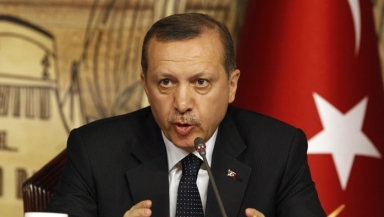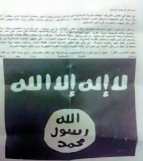
In a move that could complicate the US-led campaign against the Islamic State, Turkey is planning to send its forces into northern Syria not to stop the ISIS from expanding what it claimed is its "caliphate" but to prevent Syrian Kurds from creating its own state in the area.
In a speech last week, Turkish President Recep Tayyip Erdogan said he will not allow Syrian Kurds to build their own state in Syria after Kurdish fighters made gains in recent weeks against ISIS, The Daily Beast reported. Erdogan vowed to send Turkish soldiers into northern Syria despite concerns aired by his generals and likely criticism from NATO allies.
"I am saying this to the whole world: We will never allow the establishment of a state on our southern border in the north of Syria," said the Turkish president. "We will continue our fight in that respect whatever the cost may be."
Erdogan accused Syrian Kurds of ethnic cleansing in Syrian areas under their control.
The president and Prime Minister Ahmet Davutoglu reportedly decided to deploy up to 18,000 Turkish soldiers over the border and into Syria to drive ISIS away from the Turkish border and at the same time keep the Syrian Kurdish party PYD from taking full control of the frontier.
The troops will occupy a strip of Turkish territory up to 30 kilometres deep and 100 kilometres long which is currently controlled by ISIS. From east to west, it stretches from near the Kurdish-held city of Kobani to an area controlled by the pro-Western Free Syrian Army (FSA) and other rebel groups, starting around the town of Mare.
The so-called "Mare Line" will be guarded by ground troops, artillery and air cover, the reports said, with preparations set to be finalised this Friday.
The government has yet to deny or confirm such reports by the media.
Erdogan has predicted that Syrian Kurds will press on to form their own state as Syria falls apart after over years of conflict. Turkey sees Syrian Kurdish fighters as a serious national security threat because of their connection to Kurdish nationalists in Turkey, who continue to have a decades-long insurgency against the Turkish state, The New York Times said.
Turkey is also worried that the Kurds will set their sights on the area west of Kobani and toward Mare to link up with the Kurdish area of Afrin, thereby connecting all Kurdish areas in Syria along the border with Turkey.
"Any Turkish action in Syria would complicate Turkey's strained efforts to reach peace with its own Kurdish minority," the New York Times commented.
"In effect, a buffer zone would hinder Kurdish gains more than it would curb the advances of ISIS," said Selahattin Demirtas, the leader of the pro-Kurdish People's Democratic Party.
The Turkish military, however, is reluctant to engage ISIS and Syrian Kurdish fighters as Turkey might get entangled into the Syrian dilemma, military sources said, adding that Turkish generals have already warned against retaliation attacks by ISIS and Kurdish militants on Turkish territory.
Military leaders also cautioned that the international community, including NATO allies, who have stationed troops managing the Patriot missile defence units near the Syrian border to shield Turkey, might oppose Turkey's intervention.
For the US, the Kurds have only been the viable partners in fighting off ISIS.
An unnamed senior US official said that the biggest problem is "finding guys who want to fight ISIS. They all want to fight Assad."

















